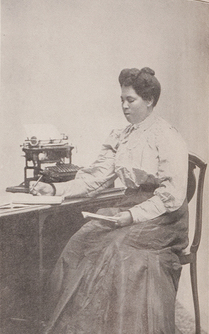Lizelia Augusta Jenkins Moorer facts for kids
Quick facts for kids
Lizelia Augusta Jenkins Moorer
|
|
|---|---|
 |
|
| Born | September , 1868 Pickens, South Carolina, U.S.
|
| Died | May 24, 1936 (aged 67) |
| Occupation |
|
| Spouse(s) | Jacob Moorer |
Lizelia Augusta Jenkins Moorer (born September 1868 – died May 24, 1936) was an important American poet, teacher, and activist. She lived and worked in Orangeburg, South Carolina. She used her writing and her voice to fight for fairness and equal rights for African Americans.
Early Life and Education
Lizelia Augusta Jenkins was born in September 1868. Her parents were Warren D. Jenkins and Mattie Miller. She grew up in Pickens, South Carolina.
She became a teacher and shared her knowledge with many students. From 1895 to 1899, she taught at the Normal and Grammar Schools. These schools were part of Claflin University in Orangeburg, South Carolina.
Fighting for Justice with Words
In 1907, Lizelia Moorer published a book of poems. It was called "Prejudice Unveiled and Other Poems." Her poems were very powerful. They spoke out against unfair treatment of African Americans.
A professor named Joan R. Sherman said her poems were some of the best. She believed they were the strongest poems about racial issues written by a Black woman for a long time. Lizelia Moorer wrote about serious problems. She spoke against violence, unfair labor practices, and segregation laws. Segregation laws, known as Jim Crow laws, kept Black and white people separate. She also criticized the unfairness she saw in some churches and newspapers.
Activism and Family Life
In 1899, Lizelia married Jacob Moorer. He was a lawyer in Orangeburg. Jacob Moorer often defended the rights of Black people. He worked to challenge unfair laws in South Carolina. He especially fought against election laws that he felt were unjust.
Lizelia Moorer was also a strong activist herself. Besides her poetry, she was active in the Woman's Christian Temperance Union. This group worked to reduce the use of alcohol. In 1910, she was the State Vice-President for this group in South Carolina.
In 1924, she attended a big meeting for the Methodist Episcopal Church. At this meeting, she gave a speech. She argued that women should be allowed to become ordained ministers in the church. Because of her efforts and others, women were given the right to be ordained as local deacons and elders at that conference.
Lizelia Augusta Jenkins Moorer passed away on May 24, 1936, in Orangeburg, South Carolina. Her work as a poet, teacher, and activist left a lasting impact.

